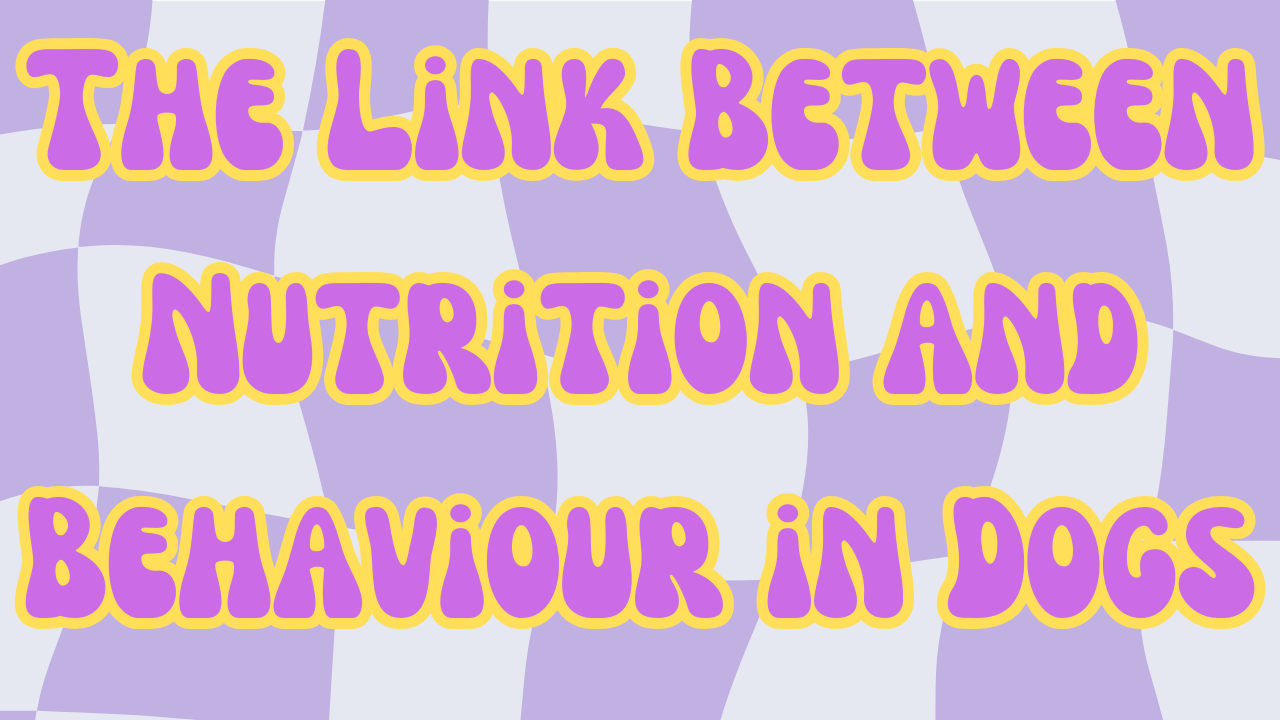Ever noticed how your mood changes when you’re hungry? Maybe you get cranky, tired, or even a little hangry? 🤬🍽️ Well, the same goes for our dogs! What they eat doesn’t just affect their health – it also plays a HUGE role in their energy levels, mood, and behaviour.
So, can the right diet turn a hyper pup into a calm companion? Or help an anxious dog feel more at ease? Let’s dive into the fascinating link between nutrition and behaviour! 👇
1. Blood Sugar Levels & Energy Spikes ⚡🍞
Just like in humans, a poor diet can lead to wild energy swings in dogs.
🐾 The problem:
❌ Low-quality foods high in simple carbs (like corn or wheat fillers) cause sugar spikes.
❌ These spikes lead to bursts of hyperactivity, followed by crashes that make dogs irritable or lethargic.
❌ This is especially a problem for high-energy breeds like Border Collies or Huskies!
🐾 The fix:
✔️ Feed high-quality protein to keep energy levels stable. 🥩🐟
✔️ Choose complex carbs (like sweet potato or brown rice) over simple ones. 🍠
✔️ Avoid artificial additives that can trigger restlessness or hyperactivity.
2. Protein Quality & Aggression Levels 😡🍗
Protein isn’t just for muscle growth – it also impacts mood and behaviour!
🐾 The problem:
❌ Low-quality protein sources can lead to amino acid imbalances, which affect brain function.
❌ Studies suggest that excessive protein (especially from poor sources) may increase aggressive behaviour in some dogs.
🐾 The fix:
✔️ Choose high-quality, digestible protein like fish, chicken, turkey, or lamb. 🐔🐑
✔️ Make sure protein is balanced with other nutrients – too much of it without proper carbs and fats can lead to irritability.
3. Omega-3s for a Calm, Happy Pup 🧘♂️🐟
Omega-3 fatty acids aren’t just great for skin and coat – they also have amazing effects on the brain!
🐾 The benefits:
✔️ Reduce inflammation in the brain, which may help with anxiety and stress.
✔️ Support cognitive function, keeping dogs sharp and focused.
✔️ May even help with aggression and hyperactivity!
🐾 Best sources of Omega-3s:
🥩 Fish oil
🥚 Eggs
🌱 Flaxseeds & chia seeds
🐾 Fun fact: Many high-quality supplements (like those from Anicare) include Omega-3s for brain and joint health! 🐾🐟
4. Gut Health & Mood – The Doggy Microbiome 🦠🐕
Ever heard the phrase “the gut is the second brain”? 🧠 Well, it’s true for dogs too! A healthy gut microbiome influences mood, anxiety, and even behaviour.
🐾 The problem:
❌ Poor diet, stress, or antibiotics can throw off gut bacteria balance.
❌ An unhealthy gut can lead to irritability, anxiety, or even depression in dogs.
🐾 The fix:
✔️ Add probiotics & prebiotics to support healthy digestion. 🍎🥦
✔️ Choose a high-fibre diet with natural ingredients.
✔️ Avoid artificial preservatives and fillers that mess with gut bacteria.
🐾 Great probiotic sources:
🦴 Bone broth
🥦 Fermented veggies
🦠 Probiotic supplements
5. Deficiencies That Affect Behaviour 🚨🍖
Certain vitamin and mineral deficiencies can lead to behavioural issues in dogs.
🐾 Key nutrients for a balanced mood:
🔹 Vitamin B6 & B12: Support brain function and reduce anxiety. (Found in fish & meat!)
🔹 Magnesium: Helps with relaxation and muscle function. (Found in leafy greens & seeds!)
🔹 Tryptophan: A precursor to serotonin, the “happy hormone” – helps reduce anxiety! (Found in turkey & eggs!)
🔹 Zinc & Iron: Low levels can cause lethargy and poor focus. (Found in red meat & pumpkin seeds!)
🐾 The fix:
✔️ Make sure your dog’s diet is well-balanced with essential vitamins & minerals.
✔️ Consider high-quality supplements if your pup has specific deficiencies.
Final Woof: Feed the Brain, Not Just the Belly! 🐕🍽️
What your dog eats directly impacts how they feel, think, and behave. A balanced, nutrient-rich diet can help manage anxiety, hyperactivity, aggression, and even cognitive decline in senior dogs.
🐾 Key takeaways:
✅ Avoid low-quality fillers and artificial additives.
✅ Choose high-quality proteins, healthy fats, and complex carbs.
✅ Support gut health with probiotics & fibre.
✅ Consider Omega-3s and other brain-supporting nutrients.

